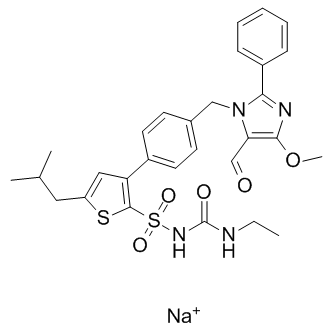AVE 0991 sodium salt |
| Catalog No.GC17686 |
Le sel de sodium AVE 0991 est un agoniste Mas du récepteur Ang-(1-7) non peptidique et actif par voie orale.
Products are for research use only. Not for human use. We do not sell to patients.

Cas No.: 306288-04-0
Sample solution is provided at 25 µL, 10mM.
IC50: AVE 0991 and Ang-(1–7) competitively bind to bovine aortic endothelial cell membranes with IC50 values of 21 ± 35 and 220 ± 280 nM, respectively.
Angiotensin-(1–7) (Ang-[1–7]) acts as a crucial component of the renin-angiotensin system which can regulate and maintain the blood pressure by offsetting effects of Ang II, a typical vasoconstrictor in vivo. AVE 0991, a nonpeptide mimic of Ang-(1–7), performs as an agonist of angiotensin-(1-7) receptor. It plays an important role in exploring effects of Ang-(1-7) and evaluating the potential of Ang-(1-7) as a cardiovascular drug. [1]
In vitro: AVE 0991 was found to compete with Ang-(1-7) for bovine aortic endothelial cell membrane receptors with an IC50 of 21±35 nM. There was no significant difference in peak concentrations of NO and O2- released from AVE 0991 treated group and Ang-(1-7) treated group. However, the released amount of NO was approximately 5 times higher in AVE 0991 group than that in Ang-(1-7) group. Moreover, AVE 0091 significantly displaced the binding of I-Ang-(1-7) in both Mas-transfected monkey kidney cells (COS) and Mas-transfected Chinese hamster ovary (CHO) cells. [1]
In vivo: AVE 0091 at a dosage of 0.58 nmol/g resulted in a significant decrease in urinary volume, together with an increase in urinary osmolality in water-loaded C57BL/6 mice. [2] The antidiuretic effect of AVE was completely offset by the Ang II antagonists, which indicting a high specificity of AVE 0991. Since Ang II induced atherogenesis and ang-(1–7) offset Ang II action, it was proved that AVE 0991 blocked atherogenesis in apolipoprotein E (apoE)-knockout mice model. [3]
Clinical trial: So far, no clinical trial has been conducted.
References:
[1]Wiemer G, Dobrucki LW, Louka FR, Malinski T, Heitsch H. AVE 0991, a nonpeptide mimic of the effects of angiotensin-(1–7) on the endothelium. Hypertension. 2002 Dec; 40: 847-52.
[2] Pinheiro SV, Silva AC, Sampaio WO, Paula RD, Mendes EP, Bontempo ED, Pesquero JB, Walther T, Alenina N, Bader M, Bleich M and Santos RA. Nonpeptide AVE 0991 is an angiotensin-(1-7) receptor Mas agonist in the mouse kidney. Hypertension. 2004 Oct; 44(4):490-6.
[3]Toton-Zuranska J, Gajda M, Pyka-Fosciak G, Kus K, Pawlowska M, Niepsuj A, Wolkow P, Olszanecki R, Jawien J and Korbut R. AVE 0991- angiotensin-(1-7) receptor agonist, inhibits atherogenesis in APOE-knockout mice. J Physiol Pharm. 2010, 61(2):181-183.
Average Rating: 5 (Based on Reviews and 29 reference(s) in Google Scholar.)
GLPBIO products are for RESEARCH USE ONLY. Please make sure your review or question is research based.
Required fields are marked with *




















